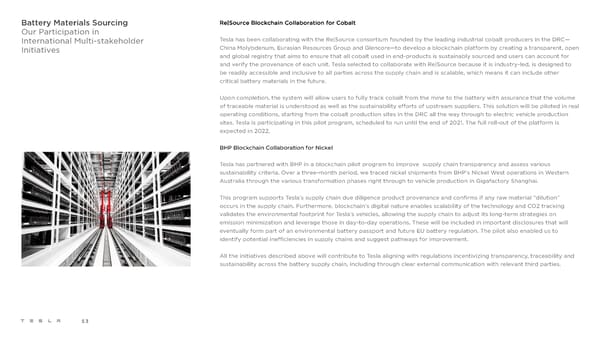Battery Materials Sourcing Re|Source Blockchain Collaboration for Cobalt Our Participation in International Multi-stakeholder Tesla has been collaborating with the Re|Source consortium founded by the leading industrial cobalt producers in the DRC— Initiatives China Molybdenum, Eurasian Resources Group and Glencore—to develop a blockchain platform by creating a transparent, open and global registry that aims to ensure that all cobalt used in end-products is sustainably sourced and users can account for and verify the provenance of each unit. Tesla selected to collaborate with Re|Source because it is industry-led, is designed to be readily accessible and inclusive to all parties across the supply chain and is scalable, which means it can include other critical battery materials in the future. Upon completion, the system will allow users to fully track cobalt from the mine to the battery with assurance that the volume of traceable material is understood as well as the sustainability efforts of upstream suppliers. This solution will be piloted in real operating conditions, starting from the cobalt production sites in the DRC all the way through to electric vehicle production sites. Tesla is participating in this pilot program, scheduled to run until the end of 2021. The full roll-out of the platform is expected in 2022. BHP Blockchain Collaboration for Nickel Tesla has partnered with BHP in a blockchain pilot program to improve supply chain transparency and assess various sustainability criteria. Over a three-month period, we traced nickel shipments from BHP’s Nickel West operations in Western Australia through the various transformation phases right through to vehicle production in Gigafactory Shanghai. This program supports Tesla’s supply chain due diligence product provenance and confirms if any raw material “dilution” occurs in the supply chain. Furthermore, blockchain’s digital nature enables scalability of the technology and CO2 tracking validates the environmental footprint for Tesla’s vehicles, allowing the supply chain to adjust its long-term strategies on emission minimization and leverage those in day-to-day operations. These will be included in important disclosures that will eventually form part of an environmental battery passport and future EU battery regulation. The pilot also enabled us to identify potential inefficiencies in supply chains and suggest pathways for improvement. All the initiatives described above will contribute to Tesla aligning with regulations incentivizing transparency, traceability and sustainability across the battery supply chain, including through clear external communication with relevant third parties. 53
 Tesla Impact Report 2020 Page 52 Page 54
Tesla Impact Report 2020 Page 52 Page 54